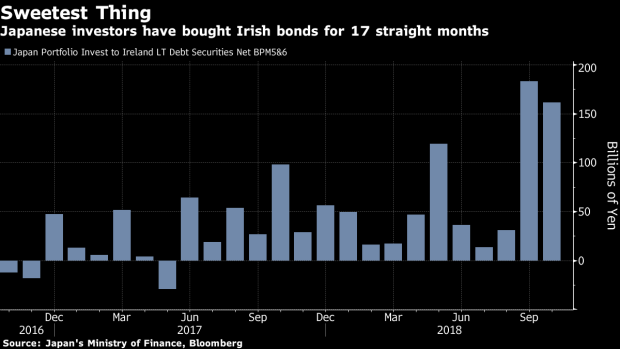Dec 14, 2018
Japan Funds See Sweet Spot in Irish Bonds Even With Brexit
, Bloomberg News

(Bloomberg) -- For 17 straight months one name has been a constant presence on the trading blotter of Japan’s investors -- Ireland.
Buoyant economic growth and improving fiscal conditions have attracted Japanese funds to Irish bonds, with purchases increasing in recent months even as uncertainty grew over whether the country’s nearest neighbor -- the U.K. -- will leave the European Union with or without an agreement.
Investors bought a net 161.5 billion yen ($1.4 billion) of Irish debt in October, according to data from Japan’s Ministry of Finance. The net purchase was just below September’s eight-year high of 183.1 billion yen, and extended a streak that began in June 2017.
Japanese funds have been looking for alternatives to traditional overseas investments such as U.S. Treasuries this year as an increase in hedging costs lowered potential returns and political risk turned them against continental European debt. Irish 10-year bonds yielded 0.97 percent Thursday, down from a February high of 1.20 percent, and compared with just 0.035 percent for their Japanese equivalents.
“Irish bonds are attractive,” said Tatsuya Higuchi, executive chief fund manager at Mitsubishi UFJ Kokusai Asset Management Co., which oversees the equivalent of more than $120 billion. “We’ve been maintaining our overweight position for a while given Ireland’s healthy economic condition and in anticipation of seeing a possible upgrade in its credit rating.”
Mitsubishi’s flagship Global Sovereign Open fund, held 6.3 percent of its portfolio in Irish sovereign bonds as of Nov. 30 against a benchmark allocation of 0.6 percent. The fund started to build positions in Irish sovereign debt around the time the country’s credit ratings were raised to single A in 2014, Higuchi said.
Brexit Opportunity
While Brexit is seen as a risk to economic growth among many Irish, Japanese fund managers see opportunities for the country.
“The Irish economy is expected to stay strong, benefiting from the impact of Brexit as overseas investment could increase,” Higuchi said. Ireland has geographic and language advantages over countries such as France and Germany, which may help attract U.K.-based international corporations, he said.
Sumitomo Mitsui Trust Asset Management Co. is also bullish on Ireland as the country recovered strongly from the European debt crisis and improved its fiscal condition, said Hideaki Kuriki, chief fund manager of the Tokyo-based company.
“Our fund started investing in Irish bonds in around 2014 when the economy was growing at a pace of around 4 percent,” Kuriki said. Attractive spreads prompted Sumitomo’s European bond fund to pour into Irish securities, though demand has fallen as spreads started to narrow, he added.
Irish Growth
The Irish economy is seen expanding 6 percent in 2018, according to a survey conducted by Bloomberg, and was the fastest-growing in the European Union during the second quarter. However, gross domestic product figures have been boosted by multinationals moving intellectual property to the country, such as Apple Inc. and its iPhone.
Irish bonds have also faced some headwinds in 2018, as concern over Brexit seeped into the market. The spread between the country’s 10-year bonds and their German peers has widened about 40 basis points this year.
Sumitomo trimmed Irish holdings in its European government bond fund to about 13 percent on of Oct. 31 from more than 40 percent in favor of Spanish debt, according to Kuriki. It doesn’t have plans to cut further.
"It will depend on how Spanish bonds will do as they account for more than 45 percent in the portfolio, but we aren’t thinking of lowering exposures to Irish bonds from the current level," he said.
(Updates prices in fourth, 11th paragraphs.)
To contact the reporter on this story: Chikafumi Hodo in Tokyo at chodo@bloomberg.net
To contact the editors responsible for this story: Tan Hwee Ann at hatan@bloomberg.net, Cormac Mullen, Nicholas Reynolds
©2018 Bloomberg L.P.